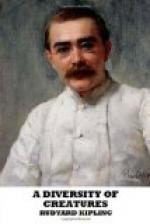They spiled along the
water-course with trunks of willow-trees
And planks of elms behind
’em and immortal oaken knees.
And when the spates
of Autumn whirl the gravel-beds away
You can see their faithful
fragments iron-hard in iron clay.
* * * * *
Georgii Quinti Anno Sexto, I, who own the River-field, Am fortified with title-deeds, attested, signed and sealed, Guaranteeing me, my assigns, my executors and heirs All sorts of powers and profits which—are neither mine nor theirs.
I have rights of chase
and warren, as my dignity requires.
I can fish—but
Hobden tickles. I can shoot—but Hobden
wires.
I repair, but he reopens,
certain gaps which, men allege,
Have been used by every
Hobden since a Hobden swapped a hedge.
Shall I dog his morning
progress o’er the track-betraying dew?
Demand his dinner-basket
into which my pheasant flew?
Confiscate his evening
faggot into which the conies ran,
And summons him to judgment?
I would sooner summons Pan.
His dead are in the
churchyard—thirty generations laid.
Their names went down
in Domesday Book when Domesday Book was made.
And the passion and
the piety and prowess of his line
Have seeded, rooted,
fruited in some land the Law calls mine.
Not for any beast that
burrows, not for any bird that flies,
Would I lose his large
sound council, miss his keen amending eyes.
He is bailiff, woodman,
wheelwright, field-surveyor, engineer,
And if flagrantly a
poacher—’tain’t for me to interfere.
‘Hob, what about
that River-bit?’ I turn to him again
With Fabricius and Ogier
and William of Warenne.
’Hev it jest as
you’ve a mind to, but’—and
so he takes command.
For whoever pays the
taxes old Mus’ Hobden owns the land.
In the Same Boat
(1911)
‘A throbbing vein,’ said Dr. Gilbert soothingly, ’is the mother of delusion.’
‘Then how do you account for my knowing when the thing is due?’ Conroy’s voice rose almost to a break.
’Of course, but you should have consulted a doctor before using—palliatives.’
‘It was driving me mad. And now I can’t give them up.’
’’Not so bad as that! One doesn’t form fatal habits at twenty-five. Think again. Were you ever frightened as a child?’
‘I don’t remember. It began when I was a boy.’
’With or without the spasm? By the way, do you mind describing the spasm again?’
‘Well,’ said Conroy, twisting in the chair, ’I’m no musician, but suppose you were a violin-string—vibrating—and some one put his finger on you? As if a finger were put on the naked soul! Awful!’
‘So’s indigestion—so’s nightmare—while it lasts.’




